Lone pair - Study guides, Revision notes & Summaries
Looking for the best study guides, study notes and summaries about Lone pair? On this page you'll find 513 study documents about Lone pair.
Page 4 out of 513 results
Sort by
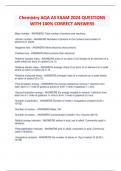
-
Chemistry AQA AS EXAM 2024 QUESTIONS WITH 100% CORRECT ANSWERS
- Exam (elaborations) • 10 pages • 2024
-
- £10.56
- + learn more
Chemistry AQA AS EXAM 2024 QUESTIONS WITH 100% CORRECT ANSWERS Mass number - ANSWERS Total number of protons and neutrons. Atomic number - ANSWERS Numbers of protons in the nucleus and number of electrons in shells. Negative Ions - ANSWERS More electrons than protons. Positive ions - ANSWERS More protons than electrons. Relative isotopic mass - ANSWERS mass of an atom of an isotope of an element on a scale where an atom of carbon12 is 12. Relative atomic mass - ANSWERS average mass o...
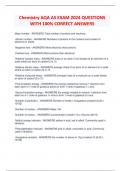
-
Chemistry AQA AS EXAM 2024 QUESTIONS WITH 100% CORRECT ANSWERS
- Exam (elaborations) • 10 pages • 2024
-
- £12.18
- + learn more
Chemistry AQA AS EXAM 2024 QUESTIONS WITH 100% CORRECT ANSWERS Mass number - ANSWERS Total number of protons and neutrons. Atomic number - ANSWERS Numbers of protons in the nucleus and number of electrons in shells. Negative Ions - ANSWERS More electrons than protons. Positive ions - ANSWERS More protons than electrons. Relative isotopic mass - ANSWERS mass of an atom of an isotope of an element on a scale where an atom of carbon12 is 12. Relative atomic mass - ANSWERS average mass o...
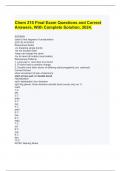
-
Chem 210 Final Exam Questions and Correct Answers, With Complete Solution, 2024.
- Exam (elaborations) • 12 pages • 2024
- Available in package deal
-
- £7.31
- + learn more
Chem 210 Final Exam Questions and Correct Answers, With Complete Solution, 2024. SOPBAR used to find degrees of unsaturation ((2C+2)-H-X+N)/2 Resonance Rules -no breaking single bonds -do not exceed octet -keep net charge the same -try to have full octets (most stable) Resonance Patterns 1. Lone pair e- next door to pi bond 2. Pi bond next to positive charge 3. Double bond btwn atoms of differing electronegativity (ex: carbonyl) Curved Arrows show movement of pair of electrons s...
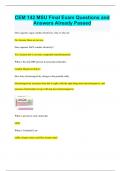
-
CEM 142 MSU Final Exam Questions and Answers Already Passed
- Exam (elaborations) • 26 pages • 2024
- Available in package deal
-
- £8.12
- + learn more
CEM 142 MSU Final Exam Questions and Answers Already Passed Does aqueous sugar conduct electricity, why or why not No, because there are no ions Does aqueous NaCl conduct electricity? Yes, because this is an ionic compound (metal/nonmetal) What is the only IMF present in non polar molecules London Dispersion Forces How does electronegativity change in the periodic table Electronegativity increases from left to right (with the right being most electronegative), and increases from bo...
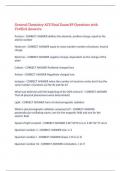
-
General Chemistry ACS Final Exam 89 Questions with Verified Answers,100% CORRECT
- Exam (elaborations) • 6 pages • 2024
-
- £9.26
- + learn more
General Chemistry ACS Final Exam 89 Questions with Verified Answers Protons - CORRECT ANSWER defines the element; positive charge; equal to the atomic number Neutrons - CORRECT ANSWER equal to mass number-number of protons; neutral charge Electrons - CORRECT ANSWER negative charge; dependent on the charge of the atom Cations - CORRECT ANSWER Positively charged ions Anions - CORRECT ANSWER Negatively charged ions Isotopes - CORRECT ANSWER when the number of neutrons varies but i...
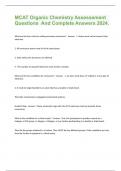
-
MCAT Organic Chemistry Assessement Questions And Complete Answers 2024.
- Exam (elaborations) • 34 pages • 2024
- Available in package deal
-
- £7.96
- + learn more
What are the four rules for writing resonance structures? - Answer 1. Atoms must not be moved. Only electrons. 2. All resonance atoms must lie in the same plane. 3. Only valid Lewis structures are allowed. 4 . The number of unpaired electrons must remain constant. What are the two conditions for resonance? - Answer 1. An atom must have a P orbital or a lone pair of electrons. 2. It must be single bonded to an atom that has a double or triple bond. The latter compromise conj...
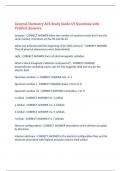
-
General Chemistry ACS Study Guide 69 Questions with Verified Answers,100% CORRECT
- Exam (elaborations) • 5 pages • 2024
-
- £9.10
- + learn more
General Chemistry ACS Study Guide 69 Questions with Verified Answers Isotopes - CORRECT ANSWER when the number of neutrons varies but it has the same number of protons ex) Ne-20 and Ne-22` What was believed until the beginning of the 20th century? - CORRECT ANSWER That all physical phenomena were deterministic Light - CORRECT ANSWER Form of electromagnetic radiation What is electromagnetic radiation composed of? - CORRECT ANSWER perpendicular oscillating waves, one for the magnetic f...
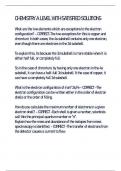
-
AQA CHEMISTRY A LEVEL WITH COMPLETE SOLUTIONS covalent bond - ANSWER-a shared pair of electrons between non-metal elements co-ordinate bond - ANSWER-a shared pair of electrons where both electrons are supplied by one atom repulsion in shapes of molecu
- Exam (elaborations) • 70 pages • 2024
-
- £15.84
- + learn more
AQA CHEMISTRY A LEVEL WITH COMPLETE SOLUTIONS covalent bond - ANSWER-a shared pair of electrons between non-metal elements co-ordinate bond - ANSWER-a shared pair of electrons where both electrons are supplied by one atom repulsion in shapes of molecules - ANSWER-Lone pair-lone pair > lone pair-bonding pair > bonding pair-bonding pair electronegativity - ANSWER-the power of an atom to attract the pair of electrons in a covalent bond hess' law - ANSWER-Total enthalpy chang...
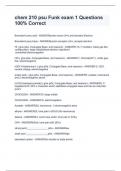
-
chem 210 psu Funk exam 1 Questions 100% Correct
- Exam (elaborations) • 5 pages • 2024
- Available in package deal
-
- £9.34
- + learn more
Bronsted-Lowry acid - ANSWERproton donor (H+) and donates Electron Bronsted-Lowry base - ANSWERproton acceptor (H+), accepts electron HI ( give pKa, Conjugate Base, and reasons) - ANSWER-10, I^-(iodide), noble gas like configuration, large orbitals(less electron repulsion) somewhat electronegative HCl ( give pKa, Conjugate Base, and reasons) - ANSWER-7, Chloride(Cl^-), noble gas-like, electronegative H3O^+(Hydronium)- ( give pKa, Conjugate Base, and reasons) - ANSWER-2, H2O, neutra...
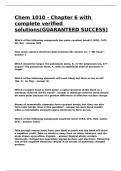
-
Chem 1010 - Chapter 6 with complete verified solutions(GUARANTEED SUCCESS).
- Exam (elaborations) • 8 pages • 2024
-
- £12.18
- + learn more
Which of the following compounds has polar covalent bonds? (H2O, CsF2, S8, Ne) H20 How many valence electrons does bromine (Br, atomic no. = 35) have? 7 Brainpower Read More Which should be larger, the potassium atom, K, or the potassium ion, K⁺? The potassium atom, K, with an additional shell of electrons is larger. Which of the following elements will most likely not form an ion at all? (Na, O , Ar, Mg) Ar Which covalent bond is more polar: a sulfur-bromin...

Did you know that on average a seller on Stuvia earns £76 per month selling revision notes? Hmm, hint, hint. Discover all about earning on Stuvia


